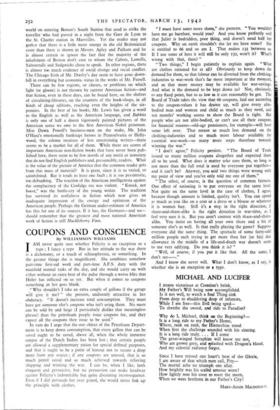COUPONS AND CONSCIENCE
By WILLIAMSON WILLIAMS I AM never quite sure whether Felicity is an exception or a
type ; I fancy a type But in her attitude to the war there is a dichotomy, or a touch of schizophrenia, or something. In the greater things she is magnificent. She combines somehow part-time first-aid work and part-time A.F.S. duty with the manifold normal tasks of the day, and she would carry on with either without an extra beat of the pulse through a worse blitz that Hitler has inflicted on us yet. But when it comes to coupons something in her goes blank.
" Why shouldn't I take an extra couple of gallons if the garage will give it me? " she persists, uniformly attractive in her obduracy. " It doesn't increase total consumption. They must have got someone else's coupons who isn't using them. No more can be sold by and large (I particularly dislike that meaningless phrase) than the petroleum people issue coupons for, and they expect all the coupons they issue to be used."
In vain do I urge that the one object of the Petroleum Depart- ment is to keep down consumption, that every gallon that can be saved ought to be saved, above all, when the whole immense output of the Dutch Indies has been lost ; that certain people are allowed a supplementary ration for special defined purposes, and that it ought to be a point of honour not to secure a drop more from any source ; if any coupons are unused, that is so much petrol saved and so much achieved towards relieving shipping and winning the war. I can be, when I like, both eloquent and persuasive, but no persuasion can make headway against Felicity's indomitable but quite disarming inconsequence. Even if I did persuade her over petrol, she would never link up the principle with clothes. " I must have some more shoes," she protests. " You wouldn't have me go barefoot, would you? And you know perfectly well that Juliet is bedridden, poor thing, and doesn't need half her coupons. Why on earth shouldn't she let me have some? She is entitled to 66 and so am I. That makes 132 between us. If I use some of hers it will still be only 532, won't it? What's wrong with that, then? "
" Two things," I begin patiently to explain again. " What are clothes rationed for at all? Obviously to keep down the demand for them, so that labour can be diverted from the clothing- industries to war-work that's far more important at the moment, and so that more money may be available for war-savings. And what is the demand to be kept down to? Not, obviously, to any fixed point, but to as low as it can reasonably be got. The Board of Trade takes the view that 66 coupons, laid out according to the coupon-values it has drai;vn up, will give every able- bodied man and woman and child as much as they need, and ten months' working seems to show the Board is right. But people who are not able-bodied, or can't use all their coupons for financial reasons—old-age pensioners, for example—will have some left over. That means so much less demand on the clothing-industries and so much more labour available for essential war-work—so many more steps therefore towards winning the war."
" I don't agree," Felicity persists. " The Board of Trade issued so many million coupons altogether and expected them all to be used. What does it matter who uses them, so long as not more than the full total is used by everyone put together— and it can't be? Anyway, you said two things were wrong with my point of view and you've only told me one of them."
"The other, of course, is the question of common fairness. One effect of rationing is to put everyone on the same level. Not quite on the same level in the case of clothes, I agree, because though amount is limited, quality isn't. You can spend as much as you like on a coat or a dress or a blouse or whatever it is women buy. Still it's a step in the right direction, if share-and-share-alike is the right direction in war-time, as I feel very sure it is. But you aren't content with share-and-share- alike. You insist on having all your own share and a bit of someone else's as well. Is that really playing the game? Suppose everyone did the same thing. The spectacle of some forty-odd million people each trying to get more than her (or his) due allowance in the middle of a life-and-death war doesn't seem to me very edifying. Do you think it is? "
" Well, of course, if you put it like that. All the same, I don't see—."
And I know she never will. What I don't know, as I say, is whether she is an exception or a type.


























 Previous page
Previous page